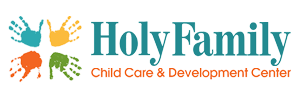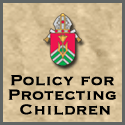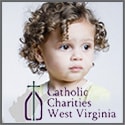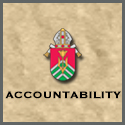
Curriculum
The programs at Holy Family focus on five major areas of development: social/emotional skills, language skills, cognitive skills, motor skills, and hygiene/self-help skills. A schedule for daily activities and a weekly lesson plan is available for each age group. Activities include academics, special projects, field trips, etc. Each classroom follows a consistent schedule that joins routines such as eating and resting with learning activities. Children develop a variety of skills such as singing, listening, building, sharing, reading, discovering, negotiating, problem solving, role playing, counting, and sorting. A quarterly newsletter will be made available to you either by hard copy or electronically to help keep you informed of center activities and news.
The children are grouped by age and developmental level. Expected entrance date into Kindergarten is also considered. Activities and learning expectations are adjusted to the age, maturity, and abilities of the children in the group. The center serves children with special needs by consulting parents, appropriate professional health consultants, and staff members to develop lesson plans (including sufficient staff and equipment) that encourage growth for each individual child.
Transition from classroom to classroom is based on each child’s individual growth, development, and age. Parent consultations promote communication about each child’s readiness to move to the next classroom. Parents are encouraged to visit the new classroom and get to know the teachers prior to the move. Each child will begin visiting their new classroom prior to moving into the group. The visits will be monitored by the Floor Coordinators and adjustments made according to the child’s needs. The process of transition from one class to another may be difficult and/or exciting for children and parents. The Holy Family staff works to make a smooth transition for everyone involved.
Conscious Discipline
Conscious Discipline is an approach to social-emotional learning and behavior management that is primarily used in educational settings, although its principles can also be applied in other contexts such as families and communities. It was developed by Dr. Becky Bailey, an educator and developmental psychologist. Conscious Discipline is designed to help individuals, especially children, develop self-regulation, emotional intelligence, and positive interpersonal skills.
Key components of Conscious Discipline include:
The approach emphasizes the importance of adults modeling self-control and emotional regulation for children. It teaches adults how to remain calm and composed in challenging situations, which in turn helps children learn these skills through observation and practice.
Conscious Discipline places a strong focus on helping individuals, including children, recognize and understand their own emotions and the emotions of others. It encourages empathy and effective communication to resolve conflicts and build positive relationships.
Instead of relying on punitive measures or punishment, Conscious Discipline promotes the use of positive discipline techniques that teach children appropriate behaviors and problem-solving skills. It encourages educators and parents to address misbehavior with empathy and teachable moments.
The program is rooted in an understanding of brain development and how emotions impact learning and behavior. It offers strategies to help individuals regulate their emotions and make better choices by engaging the prefrontal cortex, the part of the brain responsible for decision-making and impulse control.
Conscious Discipline emphasizes the importance of building strong connections between adults and children. It encourages caregivers, educators, and parents to establish a safe and supportive environment where children feel valued and loved.
The approach teaches individuals, especially children, how to identify problems, express their needs and feelings, and work together to find solutions. It promotes problem-solving skills and healthy conflict resolution techniques.









